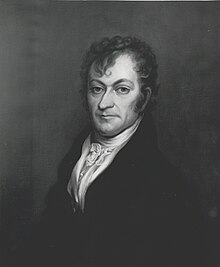Edward Livingston
| Edward Livingston | |
|---|---|
 |
|
| United States Minister to France | |
|
In office September 30, 1833 – April 29, 1835 |
|
| Appointed by | Andrew Jackson |
| Preceded by | William C. Rives |
| Succeeded by | Lewis Cass |
| 11th United States Secretary of State | |
|
In office May 24, 1831 – May 29, 1833 |
|
| President | Andrew Jackson |
| Preceded by | Martin Van Buren |
| Succeeded by | Louis McLane |
|
United States Senator from Louisiana |
|
|
In office March 4, 1829 – May 24, 1831 |
|
| Preceded by | Charles Dominique Joseph Bouligny |
| Succeeded by | George A. Waggaman |
| Member of the U.S. House of Representatives from Louisiana's 1st congressional district | |
|
In office March 4, 1823 – March 3, 1829 |
|
| Preceded by | District created |
| Succeeded by | Edward Douglass White, Sr. |
| 46th Mayor of New York City | |
|
In office 1801–1803 |
|
| Preceded by | Richard Varick |
| Succeeded by | DeWitt Clinton |
| Member of the U.S. House of Representatives from New York's 2nd congressional district | |
|
In office March 4, 1795 – March 3, 1801 |
|
| Preceded by | John Watts |
| Succeeded by | Samuel L. Mitchill |
| Member of the Louisiana House of Representatives | |
|
In office 1820 |
|
| Personal details | |
| Born |
May 28, 1764 Clermont, Province of New York |
| Died | May 23, 1836 (aged 71) Rhinebeck, New York, USA |
| Political party | Democratic, Democratic-Republican |
| Spouse(s) | Mary McEvers, Louise d'Avezac de Castera |
| Alma mater | College of New Jersey |
| Profession | Lawyer, politician, diplomat |
| Signature | |
Edward Livingston (May 28, 1764 – May 23, 1836) was an American jurist and statesman. He was an influential figure in the drafting of the Louisiana Civil Code of 1825, a civil code based largely on the Napoleonic Code. He represented both New York, and later Louisiana in Congress and he served as the U.S. Secretary of State from 1831 to 1833.
Edward Livingston was born in Clermont, Columbia County, New York. He was the youngest son of Robert Livingston and a member of the prestigious Livingston family. He graduated from Princeton University in 1781, was admitted to the bar in 1785, and began to practice law in New York City, rapidly rising to distinction. From 1795 to 1801 Livingson was a Democratic-Republican U.S. Representative in the United States Congress from the state of New York, where he was one of the leaders of the opposition to Jay's Treaty, and introduced the resolution calling upon President George Washington to furnish Congress with the details of the negotiations of the peace treaty with the Kingdom of Great Britain, which the President refused to share. At the close of Washington’s administration, he voted with Andrew Jackson and other radicals against the address to the president.
...
Wikipedia
